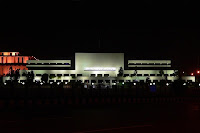
Legislative Branch
The bicameral federal legislature consists of the Senate (upper house) and National Assembly (lower house). According to Article 50 of the Constitution, the National Assembly, the Senate and the President together make up a body known as the Majlis-i-Shoora (Council of Advisers).
Pakistan's democracy has no recall method. However, past governments have been dismissed for corruption by the President's invocation of Article 58 of the Constitution. The President's power to dismiss the Prime Minister and dissolve the National Assembly was removed by the Thirteenth Amendment and partially restored by the Seventeenth Amendment.
Parliament House of Pakistan
Senate
The Senate is a permanent legislative body with equal representation from each of the four provinces, elected by the members of their respective provincial assemblies. There are representatives from the Federally Administered Tribal Areas and from Islamabad Capital Territory. The chairman of the Senate, under the constitution, is next in line to act as president should the office become vacant and until such time as a new president can be formally elected. Both the Senate and the National Assembly can initiate and pass legislation except for finance bills. Only the National Assembly can approve the federal budget and all finance bills. In the case of other bills, the president may prevent passage unless the legislature in joint sitting overrules the president by a majority of members of both houses present and voting. Unlike the National Assembly, the Senate cannot be dissolved by the President.
National Assembly
Members of the National Assembly are elected by universal adult suffrage (formerly twenty-one years of age and older but the seventeenth amendment changed it to eighteen years of age.). Seats are allocated to each of the four provinces, the Federally Administered Tribal Areas, and Islamabad Capital Territory on the basis of population. National Assembly members serve for the parliamentary term, which is five years, unless they die or resign sooner, or unless the National Assembly is dissolved. Although the vast majority of the members are Muslim, about 5 percent of the seats are reserved for minorities, including Christians, Hindus, and Sikhs. Elections for minority seats are held on the basis of separate electorates at the same time as the polls for Muslim seats during the general elections. There are also 50+ special seats for women now, and women are selected (i.e. not directly elected in the general election but given representation according to how their parties performed in the general election) on these seat by their party head: another seventeenth amendment innovation.
The bicameral federal legislature consists of the Senate (upper house) and National Assembly (lower house). According to Article 50 of the Constitution, the National Assembly, the Senate and the President together make up a body known as the Majlis-i-Shoora (Council of Advisers).
Pakistan's democracy has no recall method. However, past governments have been dismissed for corruption by the President's invocation of Article 58 of the Constitution. The President's power to dismiss the Prime Minister and dissolve the National Assembly was removed by the Thirteenth Amendment and partially restored by the Seventeenth Amendment.
Parliament House of Pakistan
Senate
The Senate is a permanent legislative body with equal representation from each of the four provinces, elected by the members of their respective provincial assemblies. There are representatives from the Federally Administered Tribal Areas and from Islamabad Capital Territory. The chairman of the Senate, under the constitution, is next in line to act as president should the office become vacant and until such time as a new president can be formally elected. Both the Senate and the National Assembly can initiate and pass legislation except for finance bills. Only the National Assembly can approve the federal budget and all finance bills. In the case of other bills, the president may prevent passage unless the legislature in joint sitting overrules the president by a majority of members of both houses present and voting. Unlike the National Assembly, the Senate cannot be dissolved by the President.
National Assembly
Members of the National Assembly are elected by universal adult suffrage (formerly twenty-one years of age and older but the seventeenth amendment changed it to eighteen years of age.). Seats are allocated to each of the four provinces, the Federally Administered Tribal Areas, and Islamabad Capital Territory on the basis of population. National Assembly members serve for the parliamentary term, which is five years, unless they die or resign sooner, or unless the National Assembly is dissolved. Although the vast majority of the members are Muslim, about 5 percent of the seats are reserved for minorities, including Christians, Hindus, and Sikhs. Elections for minority seats are held on the basis of separate electorates at the same time as the polls for Muslim seats during the general elections. There are also 50+ special seats for women now, and women are selected (i.e. not directly elected in the general election but given representation according to how their parties performed in the general election) on these seat by their party head: another seventeenth amendment innovation.
No comments:
Post a Comment